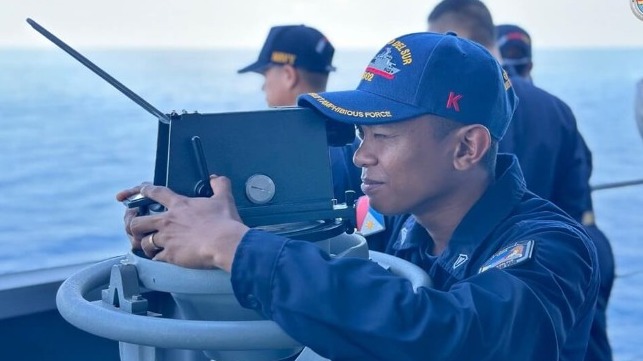Chinese Navy Shadows Historic U.S.-Philippine Exercise

China's naval forces are shadowing a joint Philippine-US exercise off the coast of Palawan, according to a spokesperson for the Armed Forces of the Philippines.
The maneuvers are the first of their kind within the Philippine Exclusive Economic Zone (EEZ), outside of the nation's territorial sea. The area is contested, and Beijing views the location as provocative: China claims a vast swath of the Philippines' western EEZ as its own under Beijing's sweeping "nine-dash line" policy, even though the claim was invalidated by an international tribunal in 2016.
AFP Western Command spokesman Capt. Ariel Joseph Coloma told local media that the Chinese destroyer Shenzhen and a PLA Navy surveillance vessel were operating a few miles away from the joint exercise, at a position about 40 miles off Palawan. A shadow escort by a competing military power is commonplace for naval maneuvers, particularly outside of a territorial sea, and China has dispatched ships to monitor U.S. exercises - like Rim of the Pacific, held every other year near Hawaii - many times before.
"As long [as] we continue to monitor and report them, we are in control of the situation," Coloma told the government-operated Philippine News Agency.
In advance of the exercise, China also doubled the presence of maritime militia and military vessels in and around the Philippine exclusive economic zone, according to the Armed Forces of the Philippines. More than 120 Chinese vessels are in the area, with the largest concentrations found near three strategic locations: Scarborough Shoal, Second Thomas Shoal and Pag-asa Island.
"This upsurge is out of the normal," Philippine Navy spokesman Commodore Roy Trinidad told GMA.
The China Coast Guard has attacked Philippine supply boats near Second Thomas Shoal, and the Chinese maritime militia has played a key role in blockading Philippine installations.
Though the uptick in presence is concerning, Trinidad said that the AFP expects Chinese forces to "behave" during the exercises because the U.S. Navy will be there.
The opinions expressed herein are the author's and not necessarily those of The Maritime Executive.
